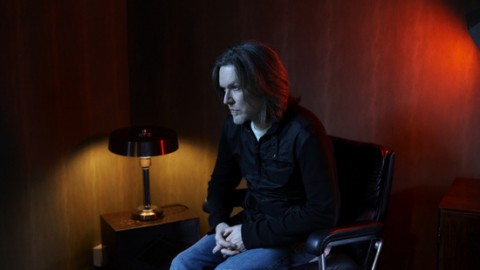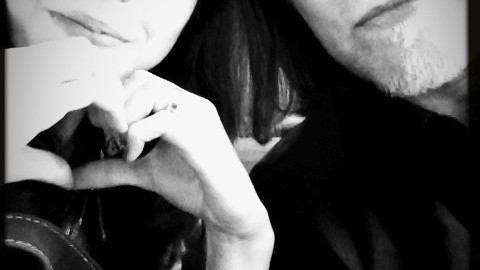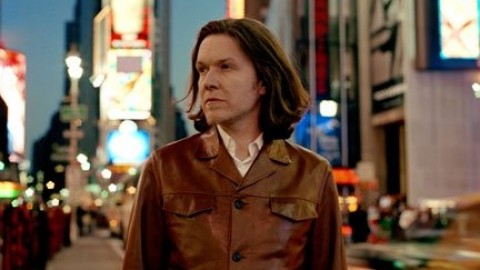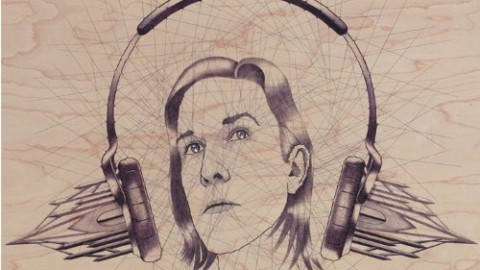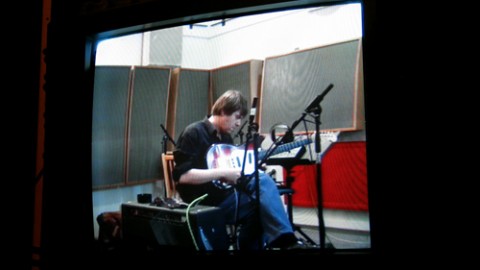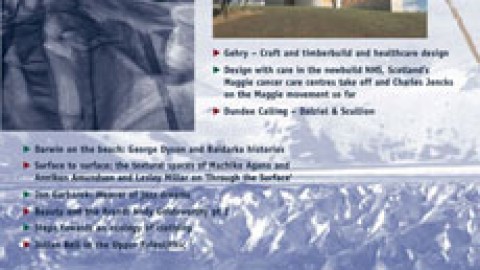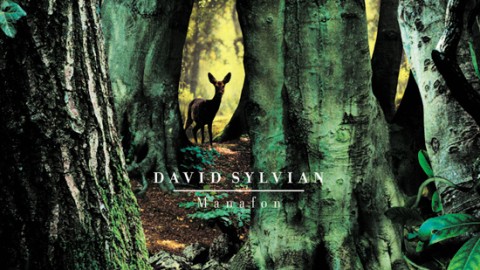by Robert Leeming
The sound on Manafon is very sparse and brittle and your voice is often the only line of melody with the music being improvised. Is your re-working of this album with Dai Fujikura an attempt to make the work more accessible? Is the accessibility of music to the listener something that is important to you? Or do you believe that it is the responsibility of the listener to work to understand, if the meaning and sensibility of a song is not presented sugar-coated in rich melody, but is hidden deeper? Or is it the responsibility of the singer to satisfy his audience?
It’s the responsibility of the artist to be true to the work whilst at the same time attempting to make it as accessible, as comprehensible, as one can. Depending on the nature of the work there’s sometimes only so much you can do regarding its accessibility. With both Blemish and Manafon I was moving into uncharted waters therefore it wasn’t going to be easy for the general audience to accompany me all the way and I was obviously aware of that fact while the work was being created. To have attempted to have made the material anymore accessible would’ve been to dilute the material’s purpose and potency but, I don’t believe this marks a disrespect for the listening audience, on the contrary, it’s an attempt to offer something of significance. It’s relatively easy to repeat the past, it’s a far harder, more heartfelt effort, to imagine the future.
Working with orchestration, fleshing out the melodic content inherent in the vocal lines, tends to make the compositions more accessible, yes. People tend to have a more immediate access to, and appreciation for, the melodies. But Dai is a fascinatingly original and protean composer, so whilst the work might ultimately be more accessible, it’ll lose none of its original complexity, in fact it seems to take on a richer complexity, to Dai’s credit, that doesn’t hinder the immediacy of the finished piece. We’re working counter to my original intentions for the compositions, in a similar way that my vocal contributions on the original worked counter to the intentions of the improvisations.
How did you go about creating the sound heard on Blemish and Manafon? What were your influences? Blemish seems to have been created on a kind of Miles Davis, improvise and see what happens basis. Was Derek Bailey in particular and his free improvisation crucial to this? And how was the sound developed onManafon?
I think it was a combination of my wanting to create something with an urgency to it, that would be rapidly completed and left in its natural state, rather than producing something over deliberated and refined. We’d started work on what was to becomeSnow Borne Sorrow (an album David recorded with his brother Steve Jansen, released in 2005 under the name Nine Horses) and the speed of production was reliably slow and, due to my emotional state, I knew this process wasn’t going to cut it for me at that moment in time. There was this sense of trauma that needed addressing, that wanted out, so we took six weeks away from that project and I started recording Blemish. I couldn’t tell you who or what was crucial in terms of influence outside of the circumstances of my public and private lives. It was part of a personal evolution whose time had come, where things would shift for me in a quietly dramatic way. I knew Derek bore some relation to the material because his was the only music I could listen to leading up to the recording itself. At that time I didn’t know how I was going to approach the work or what it might sound like so it was not a conscious absorbing of his influence or anything obvious of that nature. It was simply an intuited connection. Two thirds of the way into recording Blemish I felt I needed a counterpoint to my own approach to guitar improvisation and Derek was the first to come to mind. No one else was considered.
I felt my response to Derek’s contribution had worked well enough that the desire arose to attempt work, in a similar fashion, with larger ensembles. To be honest, it was a slightly unnerving proposition to enter a given situation with some of the best in their field with nothing concrete to offer but my assurance, guidance and intuition. Mercifully some, if not all, were familiar enough with Blemish to allow them to give me the benefit of the doubt. All were open-minded and generous in their willingness to participate, give of themselves, and in allowing me to do as I wished with the resulting recordings. So, once I had the material in hand, the process of responding to it was remarkably similar to how I’d worked on Blemish, particularly where Derek was concerned, which was a concentrated process of automatic writing and recording executed within a matter of hours. There might’ve been a 12 month delay between the recording of the music and my response to it but it was, nevertheless, what came to mind in the moment I sat with it for the first time, based on what was suggested melodically and where that led me lyrically, although this would also be heavily influenced by the subject matter I knew needed addressing and my state of mind at the time. Essentially, despite the seemingly random nature of the entire enterprise, I had a sense of what it was I was looking for and, over time and through active engagement, worked out how to go about accomplishing my goals.
Are you ever worried that an album like Manafon is simply too dense, two impenetrable for your audience? Do you ever think ‘well maybe I’ve gone too far with this one, maybe I should offer something more conventional out of fear of being alienating?’
I simply do whatever it is I’m driven to at the time of creating a work. My desire is to communicate not alienate but I can’t pander to the taste of one particular audience or a particular faction of that audience. This would only end in the failure of both the artistic and commercial merits of the material.
If an audience thinks I’ve gone too far and refuse to believe in what I’m producing as relevant or worth the effort, I’ll not attempt to persuade them otherwise, but I’ll continue to give everything of myself to the material regardless until I have to shut down the computer, put the guitar in the case for the last time and start looking at the want ads in the local paper. I’ve not divorced myself from more accessible work, as I hope the compilation indicates, and there’s no reason to believe that later solo works will move increasingly left of field. But I do choose to follow the path in which my instincts lead me. I have to trust in them as there’s nothing else I can rely on.
Spirituality and religion are obviously extremely important to you, if you follow the path of your music you have written about Buddhism, Christianity and you have considered the work of R.S Thomas on Manafon. What would you say is the bigger force in your life, music or spirituality? Or are the two intertwined?
Being, with a capital ‘B’ is the biggest force in life. Learning how to simply “Be” in the world. Music is born out of that experience, spirituality underlines or defines it either by its presence or absence.
You are pretty rare in the music sphere as man who has both chart success to his name and some albums of extremely creative, innovative, experimental music. What was the hardest to write and record, a song like Ghosts or a song like Emily Dickinson? And do you feel that you could not have written and recorded one without the other?
There has to be a starting point and in a way Ghosts represents that for me. There’s a chronology, an irregular linearity if that’s an acceptable oxymoron, in that one idea gives birth to another. There are instances of exception where a kind of personal ‘evolutionary’ leap takes place but otherwise you’re able to find signs of the present indicated in the immediate past. Neither Ghosts nor Emily Dickinson were problematic for me as composer. The most marked difference between the two is that with Ghosts the concept for the electronic arrangement came after the act of composition, whereas with Emily Dickinson I’d put all the pieces of the puzzle together prior to writing the lyric and melody.
I have read a few interviews with you and the subject has turned to the Internet and how you often communicate with people only via the net, you’ve mentioned people who you have collaborated with musically but have never actually sat in a room with for example. You have said “I’m fascinated by that: How organic a piece of music can sound and feel even though these musicians were never in the same space at the same time.” Is this still the case? Music lends itself to collective experience, how does that separation lend itself to creativity? And do you think that relying on the Internet for communication could allow us to be lulled into a comfort zone that we could become a little too used to?
On the latter issue, sure, it can be a potential problem especially for young people who believe they’ve a social life whereas, in reality, they’re completely isolated and protected from revealing anything of themselves they might find unpalatable or, the reverse, they let their inner demons out in a safe environment with no consequences or any significance. But most adults have lives that bring them into full engagement with the world at large and the personas and personalities with which to carry them through. The same can’t be said for younger people. School and college gets them out into the world but the ego isn’t fully formed, the sense of self, personal identity, isn’t fixed, is still very malleable and the social pressures intense, unforgiving, often openly hostile. But maybe you’re suggesting that the isolation could lead to an artistic comfort zone? Which seems to have worked in the reverse in my case as, whatever else I’m doing, I’m not making myself comfortable.
Regarding communications in general, sometimes the only options available are a phone call or an email. Working long distance with people in different time zones results in email being the preferred means of communication. It’s all about the music in the end not the social interaction. You speak, you engage, through the body of work. That is so much more intimate than many people I’ve spoken with seem to imagine.
As for the making of the actual music; if you’ve engaged with other musicians in a live setting frequently enough then, as in all things, you’ve gained enough experience to know how things work. There’s no right or wrong way of going about this. There is your intuition, the nature of the work at hand, and the limitations and the opportunities you’re presented with. You make the most of these. If you’re 18, working a day job and by night making music on a sampler with a HD recorder, you know what your limitations are and you pull out all the stops to make something that satisfies you and that has every chance of being as relevant, as groundbreaking, as that multi platinum band recording in a room together in the Bahamas. If working in partnership, you choose your collaborators with careful precision and half the work is done for you whether you’re recording together live or sending files across the internet. When I send a composition to Jan Bang or Arve Henriksen in Norway I know, without doubt, they will give 100% of themselves to producing what is asked of them and I hope they feel they can rely on me to do the same. Most musicians will give you multiple takes with which to work so the element of creative choice remains. Editing, placement, treatments and processing are a creative part of the work too. You might love a particular phrase as played but if you wish to change one note in the scale, you’re able to do this. I’ve recorded live in the studio with Arve and we’ve exchanged files on numerous occasions. I have no preference where the results are concerned only the nature of the work dictates which route has to be taken. Sometimes, file exchanges aren’t going to cut it, you have to be present, you have to give clear indication and guidance to a group of musicians who’ll be recording together because there’s something imperative about the nature, the essence of the work, that demands it. If working on more traditional material it’s imperative that certain elements be recorded in person. If you’re working with drums and bass for example, getting the feel of the track for something pre-composed, you’re not going to leave that to chance and interpretation, that’s going to be a booked session.
Let’s also not forget that, for the past three decades or so, in the world of popular music, there’s rarely been a group of musicians in a room together performing live. More often, with the possible exception of the basic rhythm track, the music was created one on one; producer, artist, and guest musician, the results of which were often radically edited and refined. Nothing wrong with this approach either in my opinion.
The short answer would be anything goes. It simply depends on what your needs, priorities and limitations are for any given project. In the traditional sense music lends itself to communal activity but there’s plenty of material of that nature out there. Music also lends itself to the solitary, the introspective, the cerebral and the emotional. You might choose to watch a movie in the presence of others in a cinema because that was once considered a communal experience and many still prefer that experience over a solitary one, but increasingly we seem to choose to watch a movie in a home setting, in HD, or on our laptops. We forego the communal aspect for something more intimate. It really depends on the material and the individual. There are many variations at work here, many choices we’re capable of making both as creators and consumers. As far as musicians go I would say that this development has been revolutionary, liberating. It’s made possible that which would otherwise be impossible. If you know what you’re doing, it won’t necessarily be clear to the listening public how the work was created. The question shouldn’t even arise. They should just be engaged, immersed in the results.
Are you starting to feel the kind of resolution that comes with getting older. Perhaps a better question would be did you ever feel mentally young? Did you ever feel at ease as a young man? Have you settled more into your skin with age?
Ingmar Bergman said “I myself never felt young, only immature.” There’s something in that sentence that resonates. I didn’t feel at ease when young, but then I don’t feel at ease now for entirely different reasons. I am surer of myself. I know what I’ve got to offer. Wisdom is hard won.
Does anything inspire you about the state of music in the 21st century?
Yes, plenty. So many individuals producing good work. Some of it is rightly acknowledged and highly appreciated, from Arcade Fire toRadiohead, but most artists that I enjoy listening to repeatedly, couldn’t get arrested.
Will you ever perform live again and did you feel comfortable with the experience when you did?
I have felt comfortable onstage, yes. Live performance has never been a priority of mine but that doesn’t mean it hasn’t been a valuable education on many levels and rewarding. I don’t attend live shows myself, or at least, very rarely. If I’m in a city and a friend is performing I’ll likely see them. If there’s a comparatively rare opportunity to see a performer whom I’ve long admired, who’s either semi retired or no longer tours that often, I might take it in but more often than not, I won’t. Most of my greatest musical experiences, outside of creating it, tend to be in relation to recorded work. But there have been notable exceptions.
And finally, I’ve read that someone like Bob Dylan will only ever record music after 2am in the morning. As a writer and musician what is more convivial to creativity? A summer’s day or a dark winter’s night?
A bright winter’s day.
My thanks to David Sylvian for agreeing to this interview and offering such insightful, elegant and inspiring answers.
Original article by Robert Leeming


